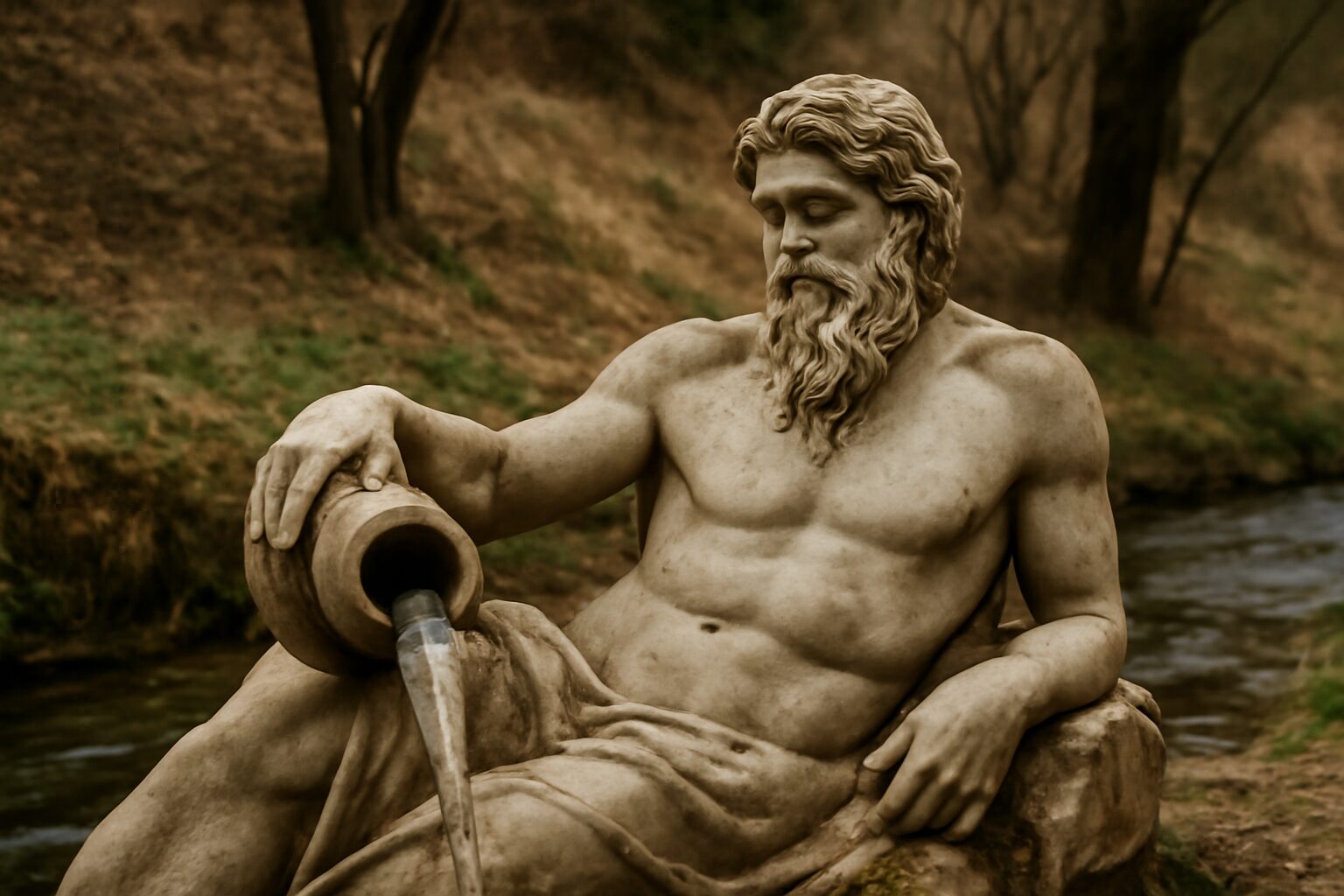Alpheus: The River God of Greek Mythology
In Greek mythology, Alpheus was the divine personification of the Alpheus River, the longest river in the Peloponnese. As a river god, he was one of the many sons of the Titans Oceanus and Tethys, making him part of the ancient and powerful lineage of water deities.
The Myth of Alpheus and Arethusa
Alpheus is best known for his passionate pursuit of the nymph Arethusa. According to legend, Arethusa, a follower of Artemis, was bathing in the river when Alpheus became enamored with her. To escape his advances, she fled across the sea to the island of Ortygia near Sicily. There, she prayed to Artemis for help, and the goddess transformed her into a freshwater spring. Undeterred, Alpheus flowed beneath the sea to reunite with her, creating a mythical connection between the Alpheus River in Greece and the Arethusa Spring in Sicily.
Powers and Role
As a river god, Alpheus possessed control over his waters and could shape their course at will. His most remarkable feat was his ability to traverse vast distances underground, as demonstrated in his pursuit of Arethusa. This power symbolized the ancient Greeks' understanding of subterranean water connections between distant locations.
Alpheus was also associated with the Olympic Games, as his river flowed near Olympia. Competitors would wash in his waters before events, and victors were sometimes crowned with wreaths made from plants growing along his banks.
Relationships and Significance
Beyond his famous chase of Arethusa, Alpheus appears in other myths. He was said to have aided Heracles during his fifth labor, temporarily diverting his waters to help clean the Augean stables. Some traditions also link him to the nymph Telegone, with whom he fathered Orsilochus, a king of Messenia.
Alpheus represents the persistence and power of nature in Greek mythology. His story reflects ancient beliefs about the mysterious connections between water sources and the enduring nature of desire. The myth also served as an explanation for the observed phenomenon of freshwater springs appearing near saltwater coasts.
Alternative Names for Alpheus
God Name: Alphaeus (Roman)
The Roman adaptation of the Greek name Alpheus, maintaining the same pronunciation and meaning but with Latinized spelling.
God Name: Potamios (Greek (Epithet))
An epithet meaning 'of the river,' often associated with Alpheus as a river god in Greek mythology.
God Name: Alpheios (Greek (Alternative))
An alternative Greek spelling or poetic variant of Alpheus, used in some ancient texts and inscriptions.
Tales about Alpheus
The River God's Unyielding Pursuit
In the ancient tales of Greece, Alpheus, the river god, became enamored with the nymph Arethusa. She was a devoted follower of Artemis, goddess of the hunt, and wished to remain chaste. To escape Alpheus's relentless advances, Arethusa prayed to Artemis for help. The goddess, moved by her plea, transformed the nymph into a spring. But Alpheus, determined and persistent, merged his waters with hers, flowing beneath the sea from Greece to Sicily, where their waters mingled eternally. This myth symbolizes the unyielding nature of desire and divine intervention in the affairs of mortals and immortals alike. The story also subtly involves Himeros, the personification of desire, whose influence is felt in Alpheus's passion, and Lethe, the river of forgetfulness, whose waters Alpheus notably avoided in his focused pursuit. Additionally, Thelxiope, one of the sirens linked to enchanting music, may have inspired the poetic flow of this tale.
Alpheus and the Wrath of Zeus
Another legend tells of a time when Alpheus dared to challenge the authority of Zeus, king of the gods. During a great flood sent by Zeus to punish humanity, Alpheus's waters swelled beyond their banks, threatening to overwhelm the land. In his arrogance, the river god boasted that he could rival the power of Olympus itself. Enraged, Zeus hurled a thunderbolt, forcing Alpheus to retreat to his course. Humbled, Alpheus learned to respect the supremacy of the gods, and his river has since flowed peacefully, a testament to the might of Zeus and the order he imposes on the world. This event echoes the roles of other deities, such as Kydoimos, the personification of the din of battle, which could symbolize the chaotic floodwaters, and Homonoia, the spirit of concord, restored after Alpheus's submission. Furthermore, Scamander, another river god who clashed with gods in myth, shares a similar narrative of divine confrontation.
Frequently Asked Questions
Who is Alpheus in Greek mythology?
Alpheus is a river god in Greek mythology, associated with the Alpheus River in the Peloponnese. He is one of the rustic deities, often depicted as a powerful and persistent figure, famously known for his pursuit of the nymph Arethusa.
Why is Alpheus important in Greek myths?
Alpheus is important because his myth explains natural phenomena, like rivers and springs, through storytelling. His tale with Arethusa symbolizes the connection between water sources and the enduring power of nature, which was central to ancient Greek beliefs about the environment.
What is the story of Alpheus and Arethusa?
The story tells how Alpheus, the river god, fell in love with the nymph Arethusa. To escape him, Arethusa was transformed into a spring by the goddess Artemis. Alpheus, undeterred, merged his waters with hers, symbolizing the underground connection between rivers and springs.
How do rustic deities like Alpheus differ from major Greek gods?
Rustic deities like Alpheus are lesser gods tied to specific natural features (e.g., rivers, forests), while major gods like Zeus or Athena rule over broader domains like the sky or wisdom. Rustic deities often represent local, everyday aspects of nature important to rural life.
What can we learn from the myth of Alpheus today?
The myth teaches about the ancient Greeks' reverence for nature and their attempts to explain environmental mysteries through storytelling. It also reflects themes of persistence and transformation, which remain relatable in modern interpretations of love and nature's power.













